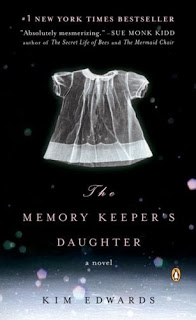Most nineteenth century authors wrote with the motto “to teach and to entertain.” They knew the power of a story to draw their reader in and instruct better than any lecture could. They were social reformers as well as authors, but their novels are also entertaining and touching. Although the social conditions have changed (in part because of their writing), the works of these authors still engage readers today.
 This post contains affiliate links; as an Amazon Associate, I earn from qualifying purchases.
This post contains affiliate links; as an Amazon Associate, I earn from qualifying purchases.
Many modern books I’ve read lack this deeper context. They are written just to entertain, and once you have read them and been entertained, you forget them. There is no lasting value, nothing to think about once the book is finished. One book I just read reminds me of the motto of the nineteenth century writers. The Memory Keeper’s Daughter by Kim Edwards shows the consequences of one choice the main character makes.
On a stormy night, Dr. David Henry’s wife goes into labour with their first child. He gets her to the clinic where he works and, with his nurse Caroline, delivers a healthy baby son. But his wife’s labour continues and she also gives birth to a baby girl—with Down’s Syndrome. In a split second decision, based on his memories of watching his sister die young of heart disease and wanting to spare his wife that pain, he passes the baby to Caroline to take to an institution. Then he tells his wife their daughter died at birth.
Caroline does not leave baby Phoebe at the institution. She starts a new life in a new city as the foster mother of this handicapped child. For the rest of Phoebe’s life, Caroline fights so Phoebe can have as normal a life as possible. We see Phoebe as a happy, healthy child who knows her mother loves her. Caroline marries, makes friends, and raises her daughter.
Meanwhile, David’s terrible secret creates a wall between himself and his wife. His longing for his daughter causes him to demand perfection from his son. He throws himself into his clinic and his photography. His wife finds ways to cover up her loneliness after the loss of her daughter and her husband’s growing distance. She redecorates the house, becomes a travel agent, has various affairs. Their son grows up angry and neglected, as his parents are so full of their attempts to hide their pain that they cannot give him the time he needs.
The contrast between the two families that the twins are raised in is sharp in The Memory Keeper’s Daughter. David wanted to spare his family the pain of dealing with an imperfect daughter who could die young. Throughout the book, we see his deep love for his sister and his pain at her loss. Yet we are left wondering—would he have rather not had a sister than deal with that pain? At her birth, he saw only his daughter’s defects, and turned her away, and then spent the rest of his life regretting that.
Our society demands perfection. Most of us are uncomfortable around those who are not “normal”—myself included. We think everyone should talk like us, act like us, be able to do what we can. Those who cannot are excluded. Like David, we turn them away because they are not perfect. We miss what Caroline had—the gift of getting to know this person, of fighting for them, of seeing them as a unique individual.
If you liked or want to read The Memory Keeper’s Daughter, you’ll probably also like The Unfinished Child.

3 Comments
Yes, this sounds like a great book! I think it’s a fine balance. In the book I’m reading about writing, I just finished a chapter where the author talks about how young writers often come out of college with a twisted idea of what makes a good book because professors have crammed the idea that theme (the great underlying “message”) is king. He says, no, entertainment is first and foremost. If people aren’t entertained, they won’t care about the message. I guess, like so many other things in life, it’s about balance. I can’t stand a shallow, meaningless book. I just watched the movie Taxi Driver for the first time (great, but disturbing). I watched it two nights ago and haven’t thought aobut much else since. I’ve been pondering what about it hit me so hard. Probably the interesting main charactor, his mental instability, his perpetual lonliness, and his growing phsycosis. Well, I’m rambling. Good post. Good to see ya!
This sounds like an amazing book. I tried to do something similar with Redeemed. Although the writing is a bit amateurish–ok a lot amateurish–I tried to make the reader aware of life on the streets from the vagrant’s viewpoint. What is the point of writing if our writing addresses nothing. As I’m working on my next book, I’m glad for your reminder. It will help keep the purpose of writing at the forefront. Blessings and I’m enjoying your postings.
I love your comment that “What is the point of writing if our writing addresses nothing.” There are too many books out there that address nothing. Stories shouldn’t be preachy, but I think they should make the reader think about something. In a story, we have the ability to see someone else’s point of view, to “walk a mile in their shoes.”